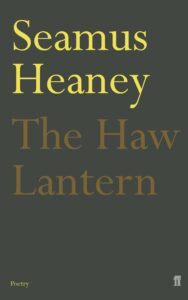Seamus Heaney followed his longest collection, Station Island, with one of his shortest, The Haw Lantern. Like several of his other collections, The Haw Lantern has a tripartite structure; unlike the others that I have read so far, its sections are not explicitly marked. Nevertheless, the ten sonnets that Heaney wrote in memory of his mother, who passed in 1984, form a middle section for the book, with the groupings of poems before and after forming distinct sections as well.
Poets construct their collections as carefully as they construct their poems — here Amanda Gorman shows pages arranged in a possible order for Call Us What We Carry — with a particular kind of experience in mind for their readers. And yet, when I came to “Clearances” in the middle of The Haw Lantern, I was not in a frame of mind to read a sonnet sequence dedicated to a deceased mother. I walked on by, and returned to “Clearances” as the last bits of The Haw Lantern that I read. Try as the poets might, readers will stubbornly insist on having their own experiences, being struck by different things upon reading the poems.
The first of “Two Quick Notes” struck me with particular force.
My old hard friend, how you sought
Occasions of justified anger!
Who could buff me like you
Who wanted the soul to ring true
And plain as a galvanized bucket
And would kick it to test it?
Or whack it clean like a carpet.
So of course when you turned on yourself
You were ferocious.
Heamey is usually more indirect or even oblique, and of course he does not say who he has in mind, letting readers fill in friends from their own lives. Still, oof.
I also especially liked “The Republic of Conscience.” Here’s the third part:
I came back from that frugal republic
with my two arms the one length, the customs woman
having insisted my allowance was myself.
The old man [an immigration clerk from the first part] rose and gazed into my face
and said that was official recognition
that I was now a dual citizen.
He therefore desired me when I got home
to consider myself a representative
and to speak on their behalf in my own tongue.
Their embassies, he said, were everywhere
but operated independently
and no ambassador would ever be relieved.
In Stepping Stones, Heaney relates that “The Republic of Conscience” was a commission for Amnesty International. Initially, he was stymied. “Amnesty had sent me some reports about the injustice and suffering endured by prisoners of conscience in different parts of the world, and all I could do at first was quail before that evidence. No cry I could have made in verse could have matched what was crying out in the dossiers.” He drew inspiration from a poem by Richard Wilbur, who made “an allegory of shame by turning it into a small cramped country.” For Heaney’s Amnesty commission, “it occurred to me that I could ask myself to do the same thing: make up an imaginary country to represent a particular state of mind or feeling. Once the job was presented in those terms, the element of play entered and I was able to cross the frontier of writing. (Stepping Stones p. 292) His work reminding readers of the power of conscience is so much stronger than a direct dirge would have been. It opens, it calls.
The other commissioned poem in the collection, “Alphabets,” also opens. “The first stanzas came to me one morning … while I was still in bed; they had clearly been prompted by [Czesław] Miłosz’s poem, “The World.” “The World” is written from the point of view of a child who’s just beginning to handle his pencil and open his primer. That agogness was exactly what I needed.” (Stepping Stones, p. 291) Heaney begins with a child learning representations and then letters, and he spirals outward through school and the world all the way out to an astronaut regarding the earth as an O before returning to the beginning:
Or like my own wide pre-reflective stare
All agog at the plasterer on his ladder
Skimming our gable and writing our name there
With his trowel point, letter by strange letter.
+++
The plasterer points to the writer’s craft, letters as his tools, making meanings stroke by stroke.


2 pings
[…] Door into the Dark (1969) Wintering Out (1972) North (1975) Field Work (1979) Station Island (1984) The Haw Lantern (1987) Seeing Things (1991) The Spirit Level (1996) Electric Light (2001) District and Circle […]
[…] with my dear father.” Heaney’s own father passed away between the publication of The Haw Lantern (which itself contains a sonnet sequence prompted by his mother’s passing) and that of Seeing […]